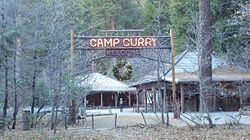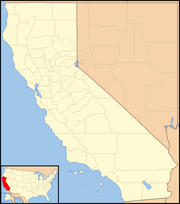Curry Village
|
Half Dome Village Curry Village |
|
|---|---|
| Unincorporated community | |

Half Dome Village, Yosemite National Park
|
|
| Location in California | |
| Coordinates: 37°44′13″N 119°34′22″W / 37.73694°N 119.57278°WCoordinates: 37°44′13″N 119°34′22″W / 37.73694°N 119.57278°W | |
| Country | United States |
| State | California |
| County | Mariposa County |
| Elevation | 4,003 ft (1,220 m) |
|
Camp Curry Historic District
|
|
| Location | Yosemite Valley, Yosemite National Park, California |
| Area | 48 acres (19 ha) |
| Built | 1924 |
| Architectural style | Bungalow/craftsman, Other, Rustic |
| NRHP Reference # | 79000315 |
| Added to NRHP | November 1, 1979 |
Half Dome Village, previously called Curry Village (also, Camp Curry) is an unincorporated community in Mariposa County, California, within the Yosemite Valley of Yosemite National Park.
A rockfall in 2008 damaged a number of structures, and about one third of visitor units were closed because of risk. In 2012, eight visitors to the park developed hantavirus pulmonary syndrome, and three died.
In 2016, Curry Village was renamed to Half Dome Village due to a trademark dispute with a private concessions company, Delaware North.
The community is 1 mile (1.6 km) southeast of Yosemite Village, at an elevation of 4,003 feet (1,220 m) and occupies a central position in the Yosemite Valley. It lies on a talus cone of debris from old rockfalls.
In 1899 David A. Curry and Jenny Etta Foster (later known as Mother Curry) opened a tented camp. They advertised "a good bed and clean napkin with every meal" for $2 a day (equivalent to $58 in 2016 dollars.)
It was developed in the early 20th century as a camp concession for tourists to the park. It contains numerous rustic wooden cabins and tented cabins, and related amenities. In 1970 the community changed its post office name to Curry Village.
Today Camp Curry offers lodging near Glacier Point. The complex, listed on the National Register of Historic Places (NRHP), includes visitor cabins, a store, dining facilities, a lodge and a post office. The camp's structures are rustic wood-framed cabins with hipped roofs, set on stone foundations. The camp includes a large number of tent cabins, framed bases with tented roofs, a lower-cost lodging alternative developed in the early 20th century. Significant structures include the 1914 entrance sign, the 1904 Old Registration Office; the 1913 dance hall, now adapted as guest lodgings known as the Stoneman House; the 1916 Foster Curry cabin, and the 1917 Mother Curry's bungalow. Bungalows with en-suite baths were built from 1918 to 1922, and bungalows without plumbing were built during the Great Depression of the 1930s.
...
Wikipedia



